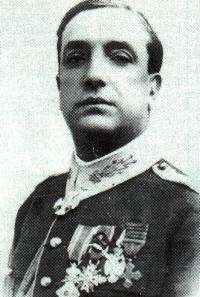Mihail Lascăr
Mihail Lascăr (Romanian pronunciation: [mihaˈil ˈlaskər]; born November 8, 1889 in Târgu Jiu, Romania; died July 24, 1959 in Bucharest, Romania) was a Romanian General during World War II and Romania's Minister of Defense from 1946 to 1947.
Mihail Lascăr | |
|---|---|
 | |
| Born | November 8, 1889 Târgu Jiu, Kingdom of Romania |
| Died | July 24, 1959 (aged 69) Bucharest, Romanian People's Republic |
| Allegiance | Romanian Army |
| Years of service | 1910–1950 |
| Rank | General |
| Commands held | 1st Mountain Brigade 6th Division Horia, Cloșca și Crișan Division Fourth Army |
| Battles/wars | Second Balkan War
|
| Awards | Iron Cross, 1st class Knight's Cross with Oak Leaves Order of Michael the Brave, 2nd class |
| 69th Minister of Defense | |
| In office 29 November 1946 – 27 December 1947 | |
| Prime Minister | Petru Groza |
| Preceded by | Constantin Vasiliu-Rășcanu |
| Succeeded by | Emil Bodnăraș |
After graduating from the Infantry Officer School in 1910 with the rank of 2nd lieutenant, he fought in the Second Balkan War and in World War I, being promoted to major. He became colonel in 1934, and brigadier general in 1939.
On January 10, 1941, he was appointed commanding officer of the 1st Mountain Brigade, an elite military unit of the Third Army. On June 22, 1941, Operation Barbarossa (the invasion of the Soviet Union by Nazi Germany and its allies) commenced, with the Mountain Brigade entering Northern Bukovina. From there, Lascăr and his unit swung East, crossing the rivers Dniester, Bug, and Dnieper. He fought in the Battle of the Sea of Azov, and then in the Battle of Crimea, remaining in charge of the Mountain Brigade until February 10, 1942. On March 11, 1942, he took charge of the 6th Division of the Romanian Third Army, and fought at the Battle of Stalingrad. After the Romanian front was broken at the Battle of Stalingrad, General Lascăr took command of the remains of the Romanian Third Army kept fighting for 4 days. He was taken prisoner on November 22, 1942, spending the years 1943-1945 in captivity in the Soviet Union.
On April 12, 1945, Lascăr became commander of the Horia, Cloșca și Crișan Division; the political commissar attached to this Soviet-organized unit was the Communist activist Valter Roman. On September 12, 1945, Lascăr was named commander of the Fourth Army. He was a leader of the Electoral Commission of the Army, in advance of the general election of November 19, 1946. After a coalition led by the Romanian Communist Party won the election (through widespread intimidation tactics and electoral fraud), he was appointed Minister of Defense, holding this ministerial portfolio from November 29, 1946 until December 27, 1947, when he was replaced by Emil Bodnăraș. He was then Inspector-General of the Romanian Army until January 12, 1950, when he was discharged from active duty.
On June 7, 1947, he signed the decree establishing the football club Asociația Sportivă a Armatei București, now CSA Steaua București.
Awards
- German Iron Cross (1939) 2nd Class & 1st Class (7 January 1942)(24 September 1941)[1]
- Knight's Cross of the Iron Cross with Oak Leaves (the first foreign recipient of this decoration)
- Order of Michael the Brave, 2nd class (31 December 1942)[2]
References
- Citations
- Thomas 1998, p. 12.
- http://www.mapn.ro/fotodb/ministrii/71_G?full=1
- Bibliography
- Thomas, Franz (1998). Die Eichenlaubträger 1939–1945 Band 2: L–Z [The Oak Leaves Bearers 1939–1945 Volume 2: L–Z] (in German). Osnabrück, Germany: Biblio-Verlag. ISBN 978-3-7648-2300-9.
External links
- Biography
- Short bio
- (in Romanian) "Mihail Lascăr, General al Armatei Române", at FC Steaua